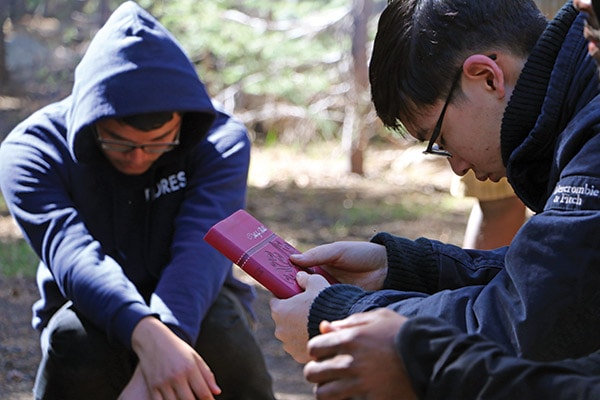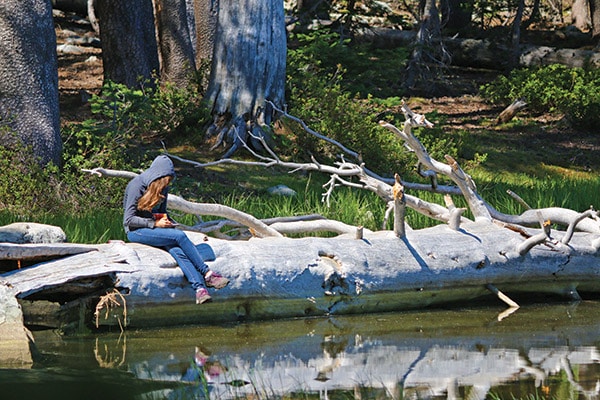
For athletes to progress in their discipline, they must endure stress. That’s one of the primary reasons they undergo intense training. While most people are averse to stress, athletes embrace stress, inducing activity to break the body down so that it can recover and become stronger. Athletes refer to their progress as gains, whether they’re speaking of an increase in muscle size, endurance threshold, or overall ability to perform. To be worthwhile, training sessions must result in gains, and training sessions cannot result in gains without inducing stress.
Stress is a crucial part of an investment in gains, but it’s only part of the process. While gains are induced by stress, they don’t occur during stressful training, but afterward during the rest-and-recovery phase. I used to train with an athlete who had the physique of an Olympian. When I asked about his secrets to training, he simply said, “I rest; that’s part of the workout. Training breaks down the body, but during the recovery phase it makes progress.”
A surprisingly powerful way to break away to find rest is to intentionally serve others.
Athletes know that rest is essential to optimize training. Recent research has taken it a step further. Researchers from Finland, the United Kingdom, and the United States all agree that even if one’s recovery phase includes sedentary relaxation, a stressed mind still impedes physical gains. So if we want to maximize recovery, we have to do more than rest the body; we must find ways to rest our minds.
Knowing Jesus on a deeper level and becoming more like Him requires a similar cycle of stressful exertion and recovery. “Six days do your work, but on the seventh day do not work” (Ex. 23:12) is how the Bible describes it.
Not only is stress induced by labor, but the Bible also catalogs trials as a facilitator of growth: “Consider it pure joy, my brothers and sisters, whenever you face trials of many kinds, because you know that the testing of your faith produces perseverance. Let perseverance finish its work so that you may be mature and complete, not lacking anything” (James 1:2-4).
After Jesus endured periods of sustained trial, He often retreated to be in prayer, sometimes all night.
Christians benefit greatly by tapping into the full potential of their spiritual rest-and-recovery phases by finding ways to rest their minds. God wants to restore peace in our minds and hearts. Here are some ways we can prime our minds and hearts for spiritual gains during recovery.
Do happy things. Hang out with friends and family. Set up a beach bonfire with lots of people and good food. No beach? Open your home or backyard. That might not sound relaxing, but I assure you that your mind and heart will find rest. You may have other ideas for activities that will lift your spirits and make your heart happy. Do them.
Serve others. A surprisingly powerful way to break away to find rest is to intentionally serve others. This takes your mind off your daily stressors.
When Jesus and His disciples were crushed by news that their companion John the Baptist was dead, Jesus encouraged His disciples to rest awhile. However, as soon as they sat down to rest, crowds of people flocked to them. Jesus, along with His disciples, got up to serve. In that moment it was probably the best thing for them, and people’s lives were changed as well.
Embrace the Sabbath. God, who created us and knows our needs, set aside a whole day for spiritual recovery and growth. If you’re a churchgoing Christian, worship with all your heart! When someone gets up to say “Good morning” or “Happy Sabbath,” say it back as cheerfully as you can. Sing with all your heart. Even if you can’t hold a note, go for it! God will love it, and you will too. When the offering plate comes around, give generously.
Give the preacher some loud “amens,” even if the sermon is boring. Sometimes a bad preacher becomes a good one with a little encouragement from the congregation. Ultimately you’ll come out of a church service much more blessed and refreshed when you worship with all your heart.
When it comes to resting on the Sabbath, take a break from such avoidable stressors as television, business transactions, etc. These things suck the life out of us more than we realize. Instead, engage in activities that allow mind and heart to rest. Be in nature or have deep, meaningful conversations with others. Anything that draws us nearer to our Creator ultimately refreshes our minds.
Savor some solitude. Along with the seventh-day Sabbath, this one is nonnegotiable. “Be still, and know that I am God” (Ps. 46:10). Even if you’re not an introvert by nature, you’ll be blown away at how life-changing a little bit of alone time with Jesus can be. Jesus did this in the morning, “Very early in the morning, while it was still dark, Jesus got up, left the house and went off to a solitary place, where he prayed” (Mark 1:35).
The Bible highlights moments of solitude experienced by many of the characters Christians look up to. Moses at the burning bush, along with his many moments in the “tent of meeting.” Elijah despairing at Mount Horeb, where God encouraged him. Jesus in Gethsemane where He acquired the strength to press on to Calvary. These were some of the moments where they experienced their greatest spiritual gains.
My colleagues and I believe in this so strongly that we take teens on weeklong backpacking trips so they can experience solitude as part of a three-week program called Teen Bible Academy. We take them backpacking so they can escape the artificial stimulation that constantly seeks to overwhelm their daily lives. Each day teens spend one to three hours alone in nature with a Bible. On these trips God becomes real, and the Bible comes to life for these young people, as well as the staff who participate. We’ve witnessed excitable teenagers develop a stable dignity about them. Each day their conversations grow deeper and more meaningful. Many teens take ownership of their spiritual journeys from that week forward.
In the world of athletics, stress-free rest and recovery can mean tenths of a second gains in performance, or a few more ounces of lean muscle mass, all of which can be the difference between winning and losing. Along the spiritual journey, however, the spiritual gains from a full rest and recovery in the presence of God can be life-changing, and can make all the difference in the world.

Teen Bible Academy is a three-week program, and each week is dedicated to a fundamental aspect of being friends with God.
The first week is dedicated to solitude, perhaps the most important part of the program. For teenagers it’s easy to think of a relationship with God as something intangible and impersonal. Because friendships at this age are so central to our lives and incredibly intimate, the idea of having that kind of relationship with someone we can’t see or hear seems far-fetched.
But the way to pursue a relationship with God is the same way to pursue any earthly relationship. We talk to our new friends, first in a group setting; then, if we like them, we hang out with them one on one. That’s what solitude week is.
Solitude week is dedicated to shaking God’s hand, asking God what His favorite food is, and simply being in His presence. Just like making a new human friend, making friends with God is about time alone together, and Teen Bible Academy facilitates that.—Levi.

Solitude is spending intentional time with God. My solitude time changes almost every time. Sometimes it’s by the ocean, in the car, or just being in a quiet room having a “tea talk” with Him. Inviting God, and having that quality time, makes my connection with God feel even stronger.—Gabby.
Andrew Uyeyama serves as associate pastor of Grass Valley Seventh-day Adventist Church in Grass Valley, California. He’s an avid rock climber and is involved in multiple athletic pursuits.